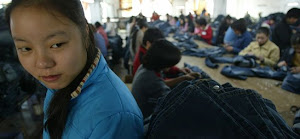Changing Paths Female Circumcision in Mali
Directed by Jacqueline Bakker for Fatusch Productions
This film focuses on the African country of Mali. In Mali roughly 93% of women are circumcised. This film explores the long held tradition which is determined a patriarchal hierarchy and unquestioned respect (read: obedience) of ancestors. This film follows Astan Diallo her work for Amsopt, a local NGO that seeks to end the practice of female circumcision. Ms. Kadidia Sibide the president of Amsopt is also introduced. Astan Daiallio travels to villages in Mali and with Ms. Sibide meets with village leaders, elder women, and the young people of the villages to try and begin the process of ending the practice in that village. The process is broken down into steps, it usually takes Amsopt 3-5 years to end female circumcision in a village. The workers are always talking to the young people of villages; however the process must always begin at the top which in Mali is with the male leaders of the village. The group asks for their permission to educate the young people and to test the health of two couples of child-bearing age. The elder women are then spoken to, elder and younger women and men are then educated using pictures and life size dolls, finally the group talks to the youth of the villages.
In the film Diallo takes us to villages in different stages of ending the circumcisions. The film ends with the promise of education in one village, and a celebration in another village of ending the practice. Amsopt works within the village on all levels. The forms of oppression are multilayered with the younger women believing the practice to be enforced by the elder women, “because they say so,” and the elder women are open about their enforcement of the practice but also admit that they do so because the “male leaders says so.” The elders admit that the circumcision is said to keep a women sexually controlled and ‘clean’ however even they are unsure how or why this is, it has always just been. The leader of the village attributes Islam as the source of the practice. However the filmmakers interview a high ranking Imam who has devoted his life to studying the Qur’an and explains that this has been a misconception perpetuated by patriarchal leaders in villages for hundreds of years. The Imam in fact has also devoted time to helping Amsopt in educating the male leaders in the villages on what Islam says about the practice.
The work shown in this film follows what Susan Moller Okin calls for in her article Feminism, Women’s Human Rights, and Cultural Differences. Female circumcision is often only recognized as a in issue in the private sphere of family and justified by the cultural traditions of that space. This film avoids the trap of the ‘outside’ critique by using Diallo, a woman born and living in Mali and the NGO Amsopt as its critic. Diallo and Sibide approach the villages following the customs of that village, they know the customs because they live there. In their education they use different styles when teaching men and women to avoid any perceived disrespect from the village men all the while stressing the truth that the circumcisions a human rights violation and that they are, by way of continuing the practice, aiding in the sickness, and death of many women and children. They use life size dolls and real circumcision pictures. All of these things help the audience become aware of the issue but also does not allow for a ‘we should ride in and save them’ response. Amsopt is doing well, they do not compromise their goal, to end circumcisions, but they do work with the villages in ways that they would be more receptive to.
Okin, Susan Moller. Feminism, Women’s Human Rights, and Cultural Differences. Uma Narayan and Sandra Harding. “Decentering the Center: Philosophy for a multicultural, postcolonial, and feminist world.” Bloomington. Indiana University Press. Pg. 26-46
Subscribe to:
Post Comments (Atom)







No comments:
Post a Comment